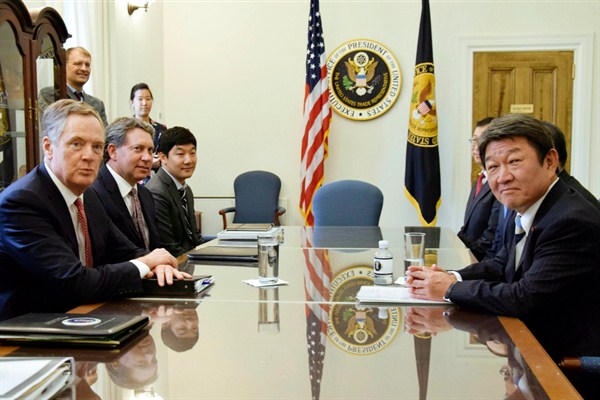U.S. Trade Representative Robert Lighthizer and Japanese Minister for Economic Revitalization Toshimitsu Motegi ended two days of “productive talks” last week and signaled they would hold another round in September. With significant gaps remaining on key issues and much at stake in the bilateral economic relationship, the next phase of talks could be an important turning point for the two allies. Negotiators are aiming to further bridge the divide on issues like auto tariffs and Japanese market access for American exports before a likely meeting next month between President Donald Trump and Prime Minister Shinzo Abe, a feasible but challenging task given the global trade environment and the upcoming election calendar in both countries.
Expectations going into last week’s meetings—the first round under a new “Free, Fair, and Reciprocal” framework announced in April—could not have been much lower. Japan had been humiliated by its lack of an exemption from U.S. tariffs on steel and aluminum, while American officials continued to hold out hopes for a bilateral trade deal, an idea that their Japanese counterparts have poured bucket after bucket of cold water on. Given this backdrop, a vaguely positive agreement to continue discussions was “quite possibly the best-case scenario, with both sides able to claim a win of sorts,” says Shihoko Goto, a senior associate in the Asia Program at the Woodrow Wilson International Center for Scholars.
“The negotiations can be touted as a win from Tokyo’s perspective because U.S. unilateralism did not prevail, no concessions were made, no new tariffs were imposed, and talks will actually continue,” Goto notes in an email. “At the same time, the latest round can be seen as a win from Washington’s perspective because anxieties about what unilateral actions the U.S. could take still remain. The possibility of auto tariffs persists, and the prospect of Japan having to make concessions in the agricultural sector in order to avert tariffs still remains.”

